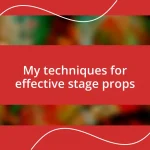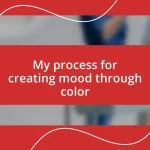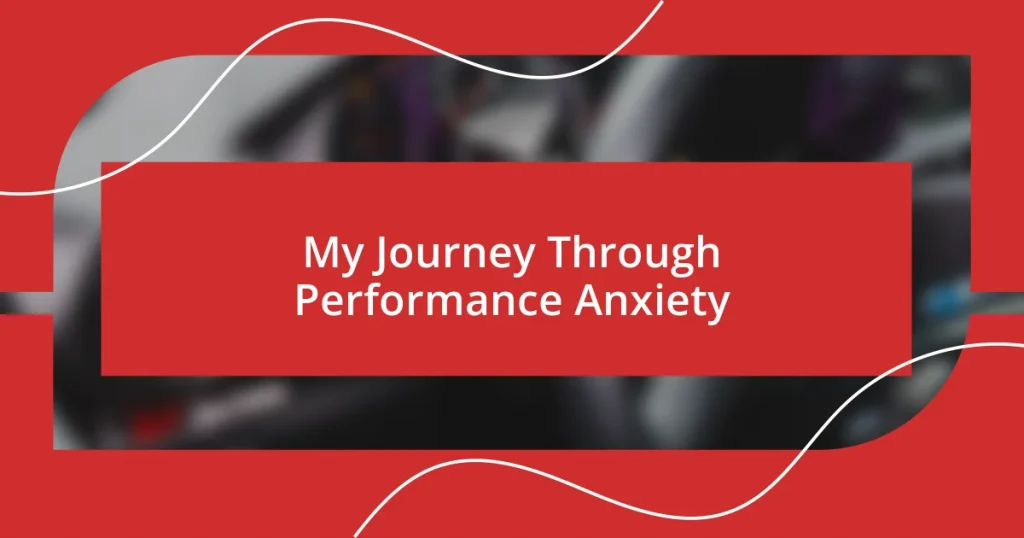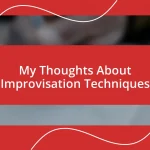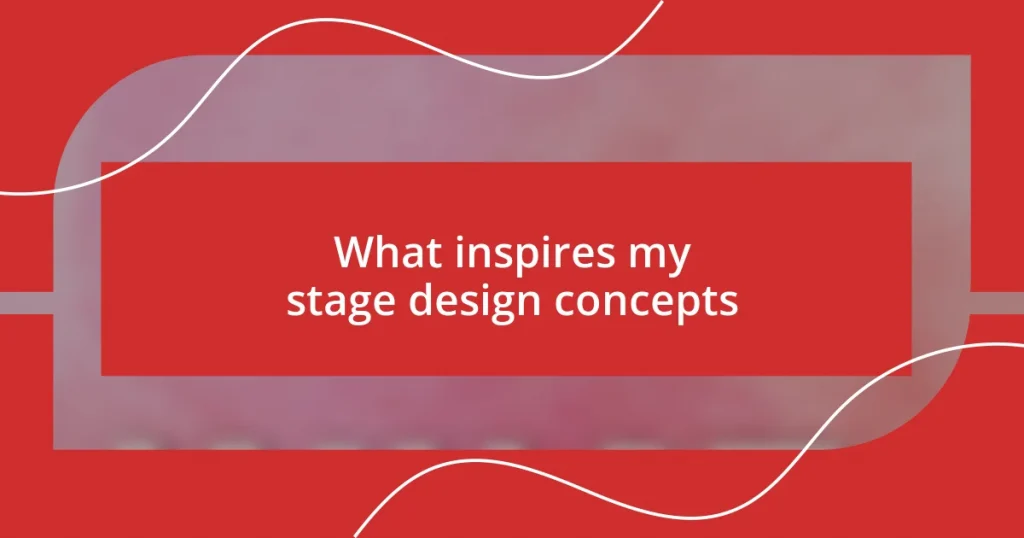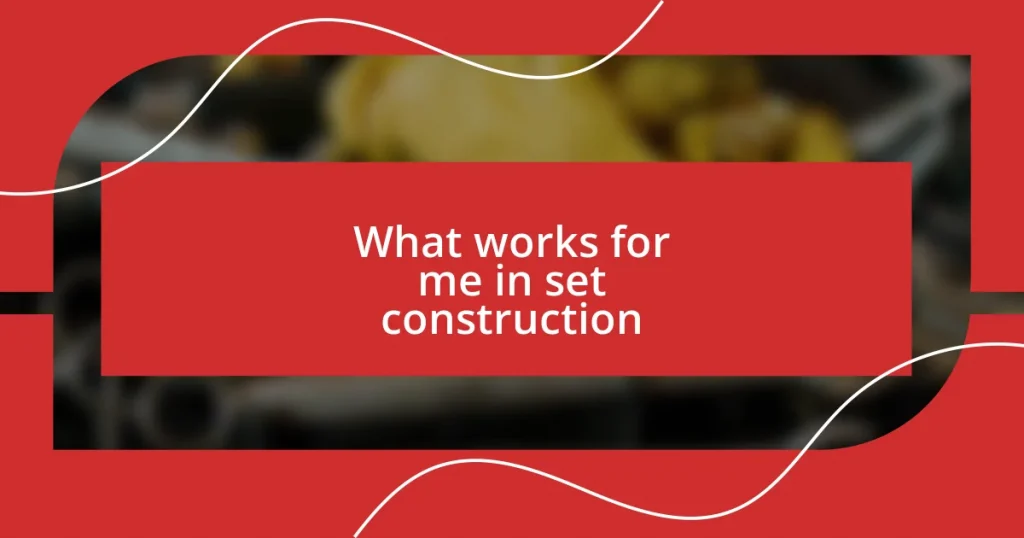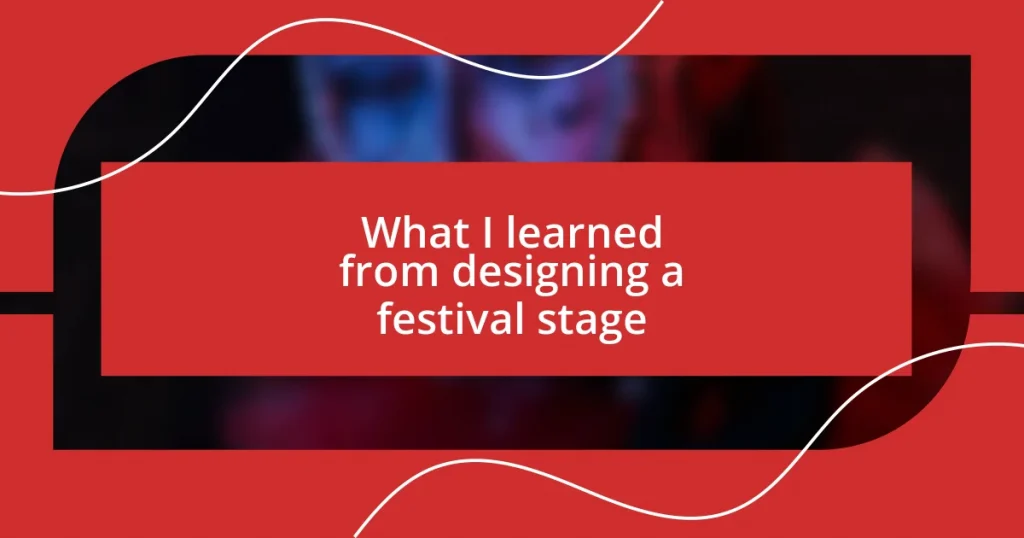Key takeaways:
- Performance anxiety is a common experience rooted in fear of judgment, but it can be transformed into a motivator for growth.
- Recognizing triggers and symptoms is crucial; employing coping strategies such as deep breathing and visualization can help manage anxiety effectively.
- Seeking professional help can provide tailored strategies and emotional support, fostering a renewed sense of purpose and confidence in overcoming performance anxiety.
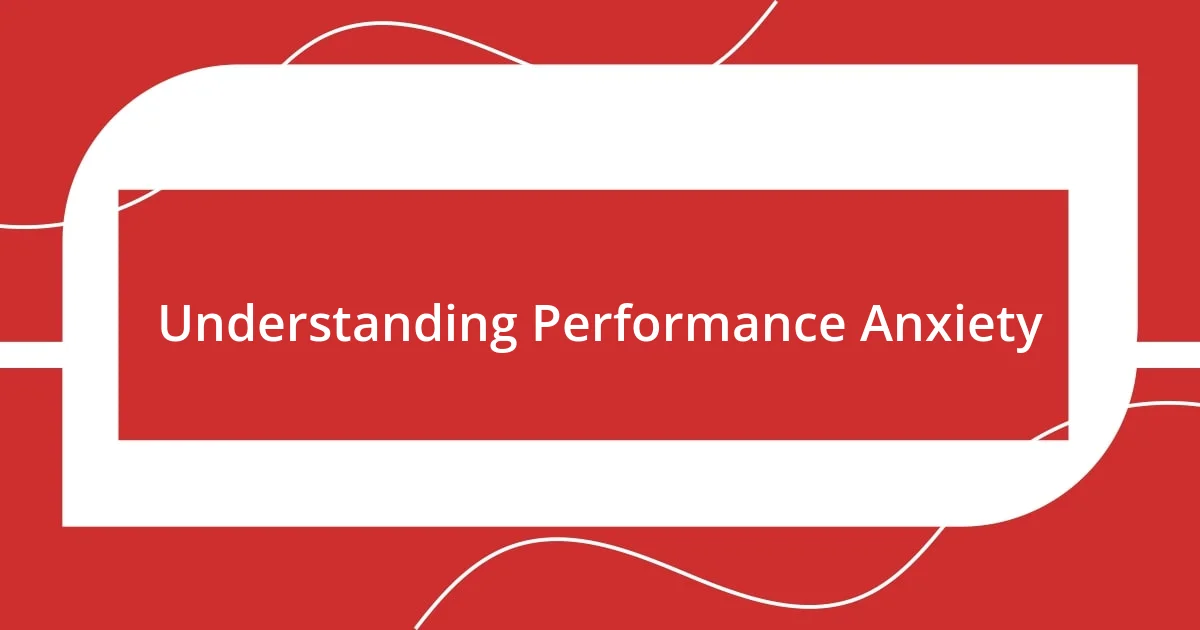
Understanding Performance Anxiety
Performance anxiety is that gripping fear that sneaks in before a presentation or performance, isn’t it? I remember a time when I could feel my heart racing as I stood backstage, sweat trickling down my back. It’s almost like your mind tells you that everyone is watching, waiting for you to fail, which only amplifies the anxiety.
At its core, performance anxiety stems from an overwhelming fear of judgment. This fear can sometimes feel like a dark cloud looming over your potential. It’s not just about worrying if you’ll forget your lines; it’s the anxiety that whispers, “What if I embarrass myself?” I’ve had moments where I felt paralyzed, unable to even take that first step onto the stage.
Understanding this anxiety also means recognizing that it’s a common experience. Many successful performers have faced it. The key, I believe, lies in transforming that fear into a catalyst for growth. Can you remember a time when your anxiety pushed you to prepare more diligently or inspire you to turn the performance into a learning experience? For me, accepting the pressure became a powerful motivator to improve.
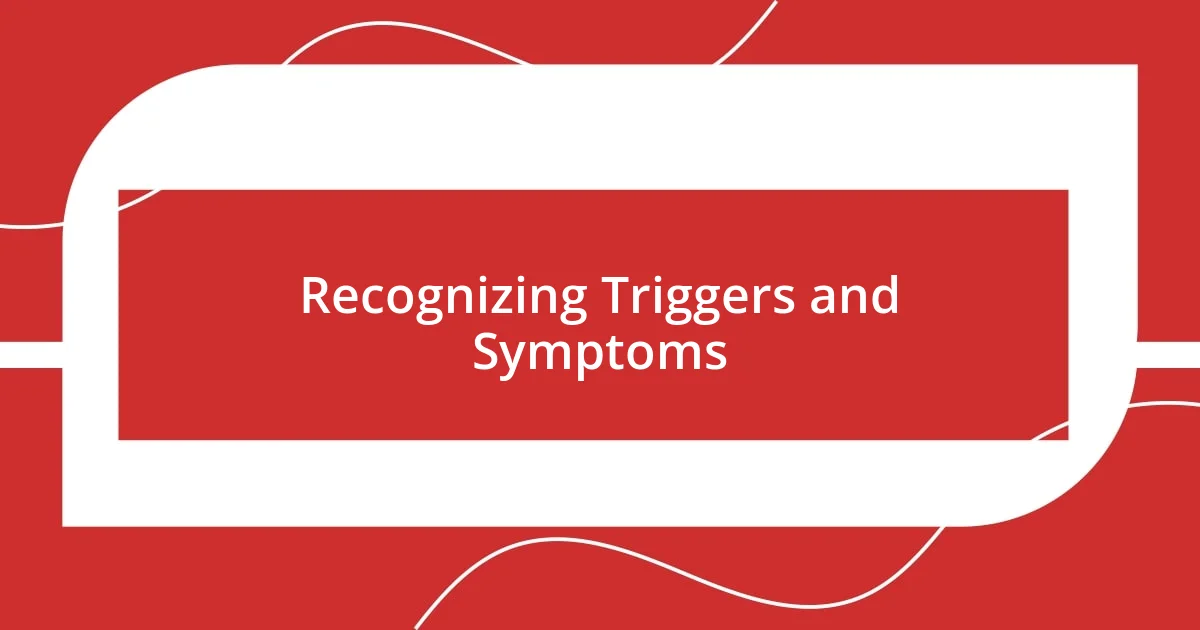
Recognizing Triggers and Symptoms
Recognizing the triggers of performance anxiety can be pivotal in managing it effectively. For instance, I’ve noticed that crowded spaces or high-stakes situations tend to amplify my anxiety. It’s fascinating how sometimes it can be as subtle as a certain facial expression from an audience member that triggers those familiar feelings of unease.
The symptoms can manifest in various ways, both physically and mentally. When I experience performance anxiety, I often feel a knot in my stomach, my hands become clammy, and my thoughts race uncontrollably. Have you experienced something similar? It’s not just about getting butterflies; it can escalate to feeling cold or even dizzy. This combination of physical sensations and spiraling thoughts creates a feedback loop that heightens the anxiety.
I have learned to identify these symptoms early on, which helps in managing my response. Recognizing these triggers allows me to employ calming techniques before stepping into the spotlight. For instance, taking slow, deep breaths has become a staple in my routine. Understanding that these reactions are common and learning how to cope with them has made a significant difference in my performances.
| Triggers | Symptoms |
|---|---|
| Crowded Spaces | Racing Heartbeat |
| High-Stakes Situations | Knot in Stomach |
| Judgment from Others | Cold Sweats |
| Negative Past Experiences | Thought Racing |
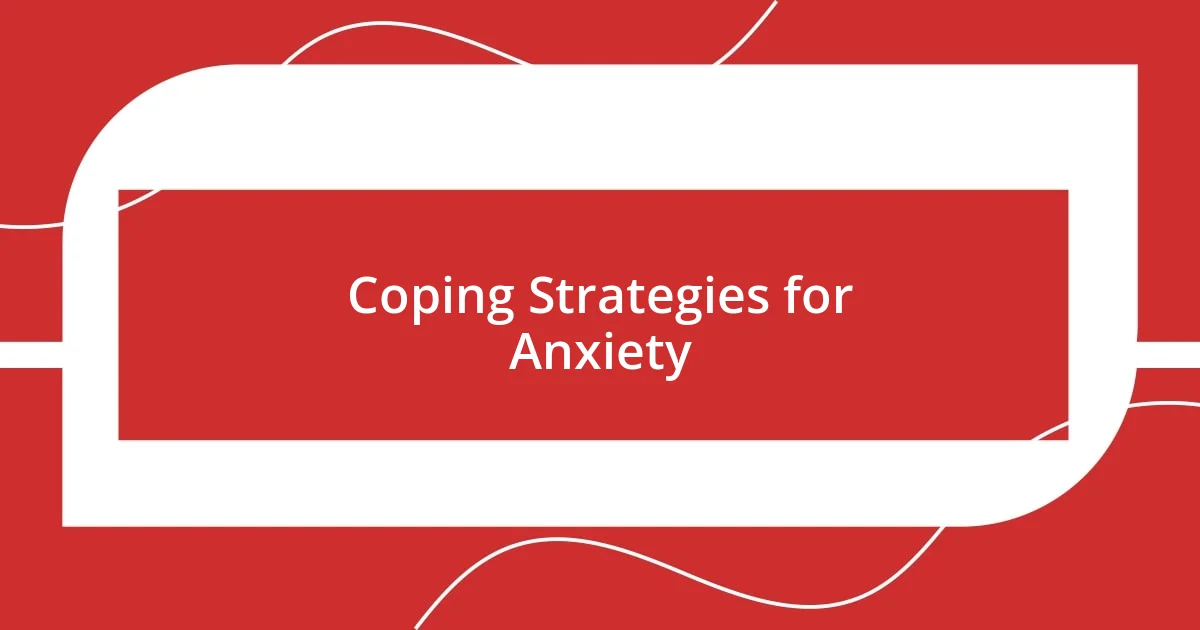
Coping Strategies for Anxiety
Coping with anxiety is a deeply personal journey, and I’ve discovered that a few strategies can make a notable difference. For me, breaking down the situation into manageable steps helps alleviate that overwhelming feeling. When I find myself feeling anxious before a performance, I remind myself to focus on one action at a time, like simply breathing or visualizing success. It’s comforting to know that I’m not alone in this; many find solace in structured techniques.
Here are some coping strategies that have worked for me:
- Deep Breathing Exercises: Inhale slowly for a count of four, hold for four, and exhale for four. I often visualize my troubles leaving with each exhale.
- Visualization Techniques: Before a performance, I picture the scene in my mind, imagining myself performing successfully. It helps me build confidence.
- Practice and Preparation: The more I rehearse, the more I feel in control, which diminishes anxiety.
- Mindfulness and Meditation: Paying attention to the present moment soothes that racing mind. I’ve found apps particularly helpful for guided sessions.
- Positive Affirmations: I repeat phrases like “I am capable” or “I can handle this,” which help combat negative thoughts.
Integrating these strategies has created a toolkit I always reach for, allowing me to embrace my performances with renewed courage. It’s a journey, no doubt, but each step feels like I’m reclaiming my power over anxiety.
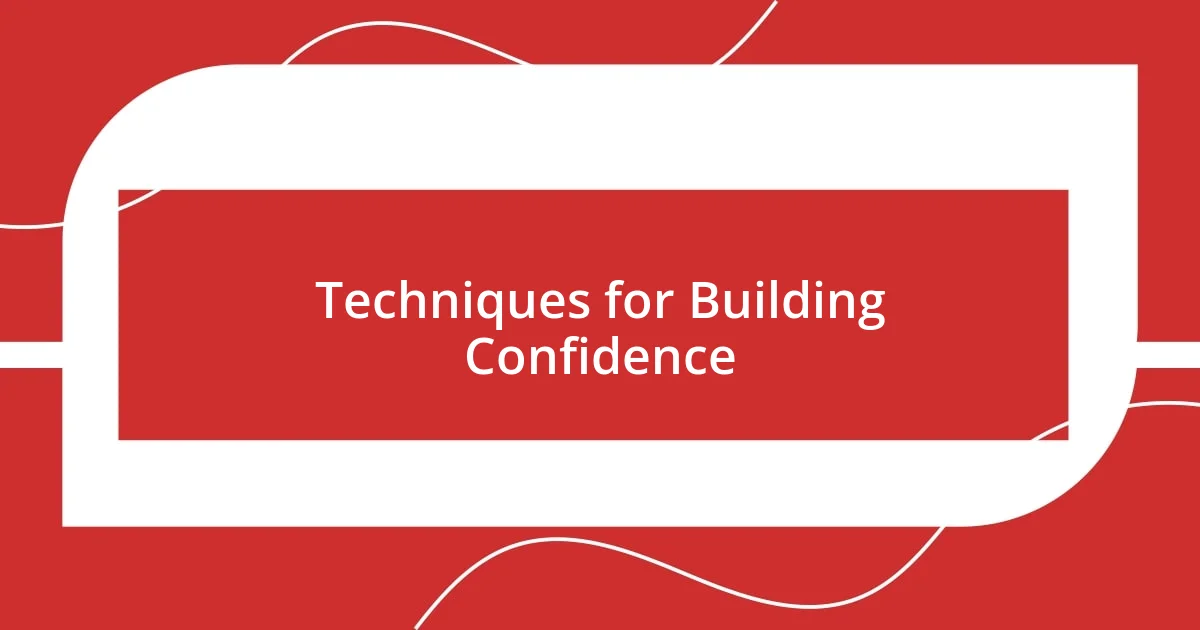
Techniques for Building Confidence
Building confidence can sometimes feel like an uphill battle, but I’ve found certain techniques that really make a difference. For instance, I’ve started keeping a “success journal” where I jot down my accomplishments, no matter how small. Reflecting on these wins reminds me that I’m capable, especially when doubt creeps in before a performance. Have you ever considered how acknowledging your successes can change your perspective?
Another approach that’s been a game changer for me is seeking feedback from trusted friends or mentors. After a performance, I often ask for their input on what went well, coupled with constructive suggestions for improvement. This supportive exchange not only boosts my confidence but helps to frame my progress in a positive light. It’s amazing how reinforcement from others can help shift that internal dialogue from criticism to encouragement.
Lastly, I find that immersing myself in positive environments is crucial. I’ve made it a habit to surround myself with inspiring people who uplift rather than bring me down. Whether it’s joining a supportive art group or attending motivational workshops, being in a space filled with positivity can ignite that confidence within me. Isn’t it fascinating how our surroundings can impact our mindset?
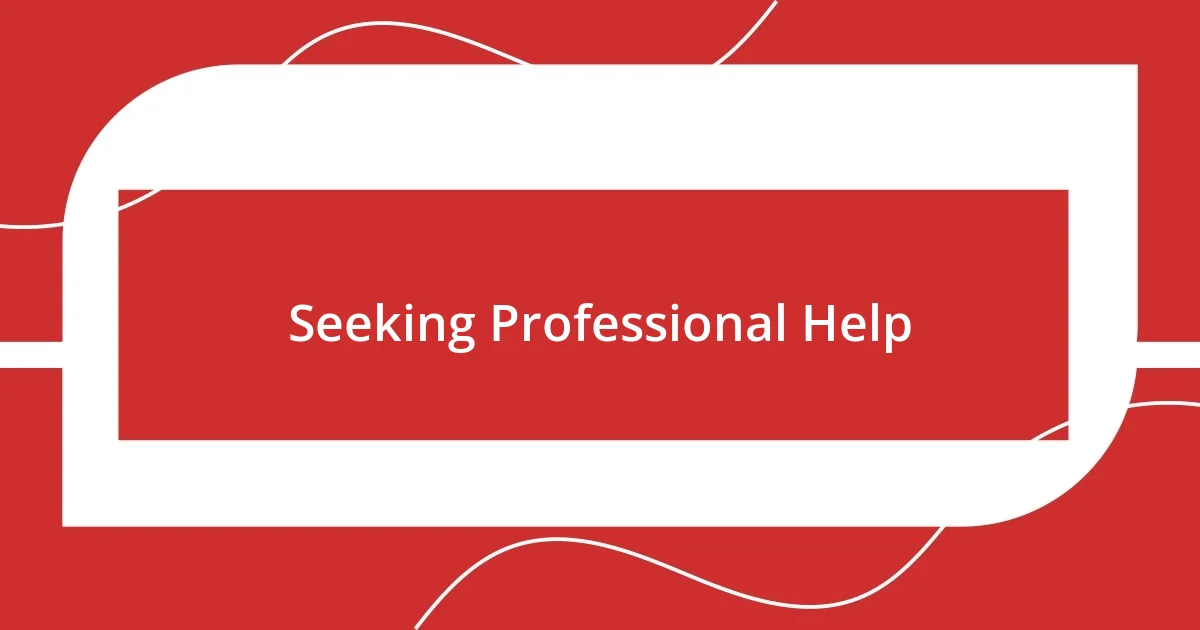
Seeking Professional Help
Seeking professional help can be a transformative step in managing performance anxiety. I remember the moment I made that decision; it felt like I was finally taking control rather than letting anxiety dictate my actions. I reached out to a therapist who specialized in anxiety disorders. It was reassuring to speak with someone who truly understood the complexities of my emotions and the fight I endured daily.
Working with a professional allowed me to access tailored strategies that felt more grounded than anything I’d attempted on my own. I was surprised by how liberating it felt to verbalize my fears. Each session brought new insights, and slowly, the fears that once felt insurmountable became less daunting. The journey made me question: what are my anxieties teaching me? I discovered that, alongside the coping mechanisms, the emotional support and accountability from a professional made a world of difference.
In my experience, seeking help isn’t a sign of weakness but rather a courageous commitment to self-improvement. As I navigated through therapy, I realized that having an unbiased ear to listen made all the difference in understanding my triggers. Have you ever contemplated how a fresh perspective could untangle those knots of anxiety? With a professional’s guidance, I learned not just to cope but to embrace my journey with a renewed sense of purpose and confidence.
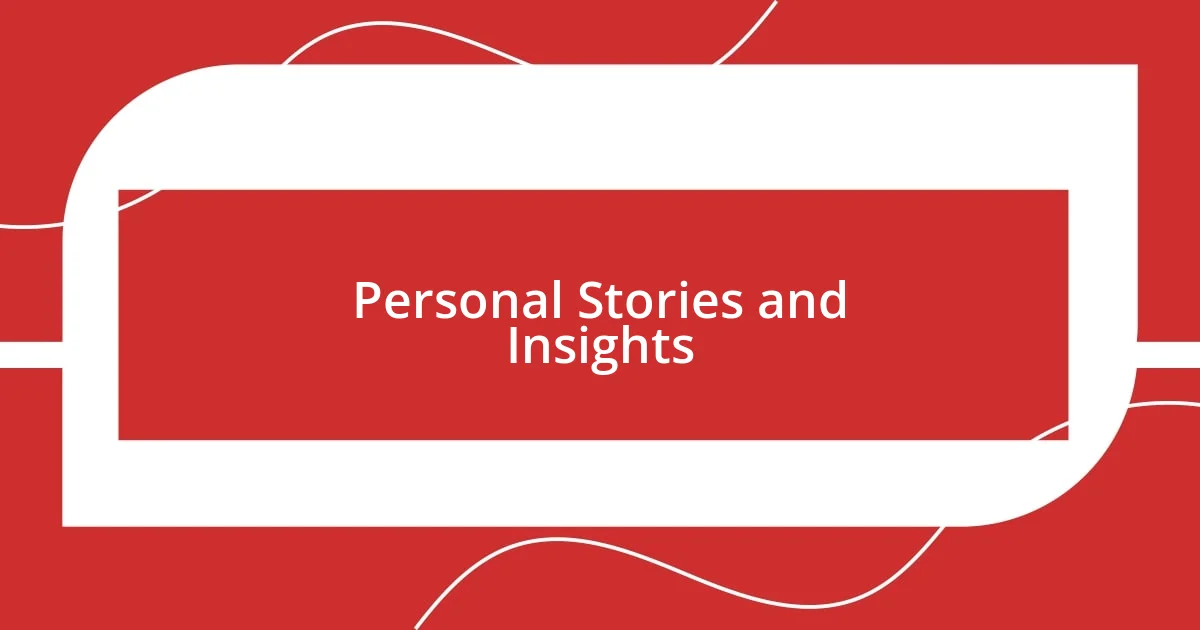
Personal Stories and Insights
I vividly recall the first time I experienced performance anxiety. It was during a high school talent show, and my hands felt clammy as I stepped on stage. I could almost hear my heart pounding in my ears. In that moment of sheer panic, I surprised myself by choosing to talk through my fear, sharing my nerves with the audience. Instead of feeling ashamed, I looked for friendly faces in the crowd, and their smiles instantly reassured me. That experience taught me something vital: vulnerability can create connection, fostering a supportive atmosphere even in high-pressure situations.
Another powerful moment came during a presentation at work, where I stumbled over my words and froze mid-sentence. Instead of letting shame take hold, I decided to laugh it off—a little chuckle that lightened the mood not just for me but for everyone in the room. It was unexpected, and I realized humor could be a healing tool. People responded with understanding; after all, we all have our off days. Have you ever wondered if there’s potential growth hidden in our mistakes? I’ve learned that embracing imperfections can be liberating, often leading to genuine engagement with others.
I also remember a period when I tried to avoid performing altogether, seeing it as a way to escape my anxiety. But escaping turned into regret; I missed exhilarating moments that could have helped me grow. Seeking opportunities, no matter how small, has taught me resilience. I’ve begun viewing each performance as a chance to tell my unique story, one filled with all its quirks and surprises. It’s a journey, isn’t it? What stories or insights have you encountered on your path? Each experience has something to teach; are we listening?
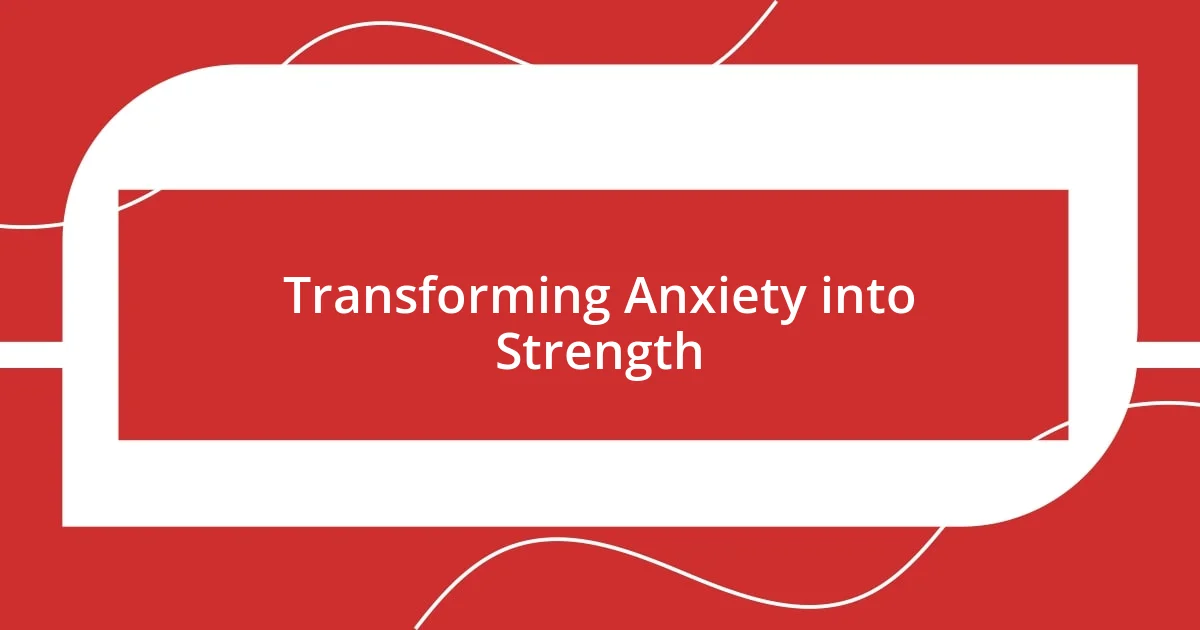
Transforming Anxiety into Strength
Transforming anxiety into strength often requires a shift in perspective that I found incredibly empowering. One evening, during a community speaking engagement, I unexpectedly stumbled over my introduction. Instead of retreating into embarrassment, I chose to embrace the moment. I shared with the audience how anxious I felt, and what surprised me was the energy in the room shifted; suddenly, I felt an unexpected surge of support from those friendly faces. Have you ever noticed how vulnerability can sometimes forge a stronger bond with others?
I also recall a time when I channeled my nerves into preparation rather than fear. I started using anxiety as a cue to work harder on my craft. Each time I felt that familiar knot in my stomach before a big presentation, it became a signal to review my material and practice one more time. This proactive approach transformed my anxiety from a crippling foe into a motivating ally. It’s fascinating how shifting my mindset allowed me to harness that energy and turn it into something productive. Isn’t it interesting how small changes in perception can lead to such significant outcomes?
Ultimately, I’ve come to view performance anxiety not just as a challenge but as a catalyst for growth. Each performance, each nerve-wracking moment has become an opportunity to learn something new about myself, pushing my boundaries further. The realization that my anxiety is not a barrier but a pathway to strength has been pivotal in my journey. Have you explored how your experiences can turn your struggles into stepping stones toward personal development? Embracing this journey is indeed a strength in itself.





